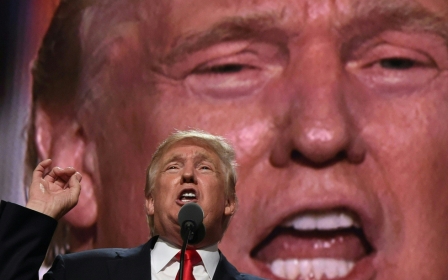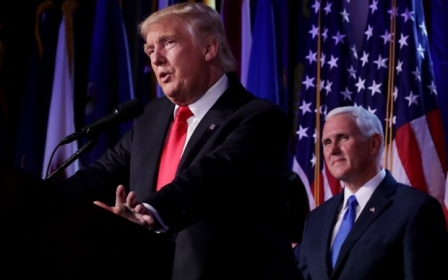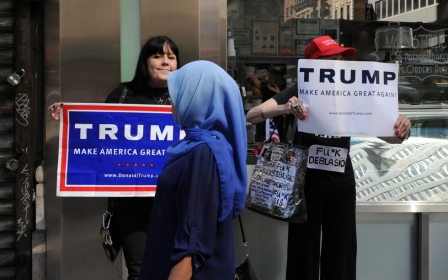Trump in the White House: The man advising him on the Middle East

Donald Trump's foreign policy adviser has signalled major shifts in Middle East strategy, including a review of the Iran nuclear deal, the recognition of Jerusalem as Israel's capital, and stating that the Muslim Brotherhood will be designated a "terrorist" organisation by the United States.
According to an interview with the pro-Egyptian government news website, Youm7, Walid Phares said on Wednesday that Trump would pass legislation to designate the Muslim Brotherhood as a "terrorist group".
The US House Judiciary Committee in February approved legislation calling on the State Department to designate the Muslim Brotherhood in Egypt as a foreign terrorist organisation. The Senate has referred a partner bill to its foreign relations committee.
According to Youm7, Phares said the delay in a decision was due to the Obama administration’s support for the group.
Phares strongly condemned the US's nuclear agreement with Iran in August, describing it as “the worst deal in history ever”. But on Thursday his comments to the BBC were more conciliatory; he said the president-elect will likely “review” the agreement rather than scrap it entirely.
“He [Trump] will take the agreement, review it, send it to Congress, demand from the Iranians to restore a few issues or change a few issues, and there will be a discussion,” Phares said.
“It could be a tense discussion, but the agreement as is right now - $750bn to the Iranian regime without receiving much in return and increasing intervention in four countries - that is not going to be accepted by the Trump administration.”
Phares had previously said that “Trump has made it clear … that he will be a strong ally of Israel, as he has always been.”
But in the same interview with the BBC, Phares said that while Trump was committed to moving the US embassy from Tel Aviv to Jerusalem, he would not do so unilaterally.
“Many presidents of the US have committed to do that, and he said as well that he will do that, but he will do it under consensus,” Phares said.
During the campaign, Trump called Jerusalem “the eternal capital” of Israel and said he was “100 percent for” moving the embassy there.
Who is Walid Phares?
Trump stoked controversy by appointing Phares to his campaign. Phares has been called a "key ideologue" of a far-right Lebanese Christian militia that committed war crimes during the Lebanese civil war.
Earlier this year, the American-Arab Anti-Discrimination Committee (ADC) denounced the Republican candidate for working with Phares, describing the latter as a "war criminal" who often promotes Islamophobia.
The Brotherhood is a decades-old social movement that came to power in Egypt in 2012, only to be ousted in a military coup led by then army chief general Abdel Fattah al-Sisi in July 2013. The Egyptian government has since led a crackdown on the organisation, with thousands of members and supporters being detained or fleeing the country.
"Dr. Phares is nothing more than an ideologue who has devoted his life to warning of fantastical plots..."
Phares, who also served as GOP presidential candidate Mitt Romney’s foreign adviser in the 2012 US presidential race, has gradually assumed an increasingly influential position as he built a reputation for himself among Republicans. He has also often appeared on Fox News and other conservative media outlets as a terrorism expert.
Both Romney and Trump were condemned by civil rights groups for relying on Phares’s expertise.
“The decision to select a proven anti-Muslim propagandist as his foreign policy adviser is particularly troubling in light of Donald Trump’s escalating anti-Muslim rhetoric…” the ADC said in a release in March. “Trump’s campaign of bigotry and xenophobia has already attracted the support of many domestic hate groups, and the selection of Dr Phares broadens the Trump campaign’s appeal to include international sectarianism as well.”
The Council on American-Islamic Relations (CAIR) similarly slammed Romney for his ties to Phares in 2012.
"Dr Phares is nothing more than an ideologue who has devoted his life to warning of fantastical plots to bring all of Western civilization under the control of radical Islam," the group said in a statement during the 2012 campaign.
US far-right website Breitbart came to Phares's defence in April, accusing his critics of being a part of a coordinated campaign against security experts led by lawmakers and NGO leaders "at the hands of the Muslim Brotherhood and pro-Iran regime fronts". Steve Bannon, the CEO of Trump's presidential campaign, is a former executive chairman of Breitbart News.
Phares's recent statements on Trump’s Middle East policies towards Israel, Iran and the Muslim Brotherhood quickly made news headlines, stirring controversy among observers.
Born in Lebanon in 1957 to a Maronite Christian family, Phares graduated from the University of Beirut with degrees in political science and sociology.
He went on to practice law in Beirut after acquiring his master’s degree in international law from the University of Lyon in France, and a PhD in international relations and strategic studies from the University of Miami in Florida.
After moving to the US in 1990, Phares started teaching in the department of international relations at Florida International University in 1992, and was then hired as a full-time professor of Middle East studies and international relations at Florida Atlantic University in 1995. He also spent time at the Ariel Institute in Jerusalem as a researcher.
Phares has written several books and research papers on topics ranging from pluralism to the Iranian Revolution, radical Islam and the War on Terror.
Among his most controversial publications is “Israel’s Alternative Policy in Lebanon,” a policy paper he wrote for the Ariel Center for Policy Research, an Israeli think-tank, in 1999, one year before Israeli occupation forces withdrew from southern Lebanon.
The piece, according to independent website Beirut Syndrome, appeals to Israel’s military and political actions in Lebanon during the civil war, and concludes that poor decisions from the Christian Right in Lebanon failed to create an ally state to Israel in Lebanon.
"People do change and their thinking changes, but [Phares] has never had to account for this past."
Away from his political and academic careers, Phares has been less public about another chapter of his life: his time as a high-ranking political official in a militia responsible for massacres during Lebanon's 15-year civil war.
During the 1980s, Phares trained Lebanese militants in ideological beliefs justifying the war against the country's Muslim and Druze factions, according to Mother Jones magazine.
Mother Jones said Phares advocated the view that Lebanon's Christians should work toward creating a separate, independent Christian enclave.
Regina Sneifer, a Lebanese woman who served with the Lebanese Forces as a teenager, said that Phares was a key ideologue for the party. In her book about her experience as a fighter in the civil war, she mentions that Phares promoted the "clash of civilizations" narrative to Christian militiamen, emphasising that they were the “vanguard of a war between the West and Islam”.
Despite never firing a bullet, Phares’s speeches and ideology reportedly played a major role in motivating the Christian Right's sect-based attacks.
Phares also was a close adviser to Samir Geagea, a Lebanese politician who was tried for ordering four political assassinations, including that of prime minister Rashid Karami in 1987 and the attempted assassination of defense minister Michel Murr in 1991.
Before becoming Trump’s foreign-policy adviser, Phares served as a terrorism guru for the president-elect.
"The key is to not let someone like him detach from the history," Lebanese journalist Mohamad Bazzi told the Washington Post in April. "People do change and their thinking changes, but [Phares] has never had to account for this past."
Middle East Eye propose une couverture et une analyse indépendantes et incomparables du Moyen-Orient, de l’Afrique du Nord et d’autres régions du monde. Pour en savoir plus sur la reprise de ce contenu et les frais qui s’appliquent, veuillez remplir ce formulaire [en anglais]. Pour en savoir plus sur MEE, cliquez ici [en anglais].




